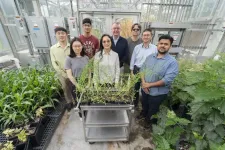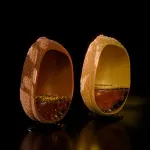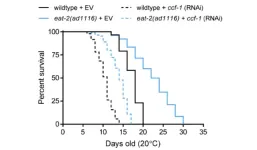(Press-News.org) UPTON, N.Y. — Efforts to achieve net-zero carbon emissions from transportation fuels are increasing demand for oil produced by nonfood crops. These plants use sunlight to power the conversion of atmospheric carbon dioxide into oil, which accumulates in seeds. Crop breeders interested in selecting plants that produce a lot of oil look for yellow seeds. In oilseed crops like canola, yellow-seeded varieties generally produce more oil than their brown-seeded counterparts. The reason: The protein responsible for brown seed color — which yellow-seeded plants lack — also plays a key role in oil production.
Now, plant biochemists at the U.S. Department of Energy’s (DOE) Brookhaven National Laboratory — who are interested in increasing plant oil synthesis for the sustainable production of biofuels and other bioproducts — have harnessed this knowledge to create a new high-yielding oilseed crop variety. In a paper just published in The Plant Biotechnology Journal, they describe how they used tools of modern genetics to produce a yellow-seeded variety of Camelina sativa, a close relative of canola, that accumulates 21.4% more oil than ordinary camelina.
“If breeders can get a few percent increase in oil production, they regard it as significant, because even small increases in yield can lead to large increases in oil production when you’re planting millions of acres,” said Brookhaven Lab biochemist John Shanklin, chair of the Lab’s Biology Department and leader of its plant oil research program. “Our nearly 22% increase was unexpected and could potentially result in a dramatic increase in production,” he said.
Straightforward idea, unusual plant
The idea behind developing this high-yielding strain of camelina was straightforward: mimic what happens in the naturally occurring high-yielding, yellow-seeded varieties of canola.
“Breeders had identified plants with more oil, some of which happened to have yellow seeds, and they didn’t really worry about the mechanism,” Shanklin said. But once scientists discovered the gene responsible for both the yellow seed color and increased oil content, they had a way to potentially increase oil yield in other species.
The gene has the instructions for making a protein known as Transparent Testa 8 (TT8), which controls the production of compounds that give seeds their brown color, among other things. Importantly, TT8 also inhibits some of the genes involved in oil synthesis.
Xiao-Hong Yu, who led this project, hypothesized that getting rid of TT8 in camelina should release the inhibition on oil synthesis — and free up some carbon that can be channeled into oil production.
Getting rid of a single gene in camelina is very challenging because this plant is unusual among living things. Instead of having two sets of chromosomes — meaning two copies of each gene — it has six sets.
“This ‘hexaploid’ genome explains why there aren’t any naturally occurring yellow-seeded varieties of camelina,” Yu explained. “It would be highly unlikely for mutations to arise simultaneously in all six copies of TT8 to completely disrupt its function.”
Gene-editing strikes oil
Thanks to the tools of modern genetics, the Brookhaven team had a way to knock out all six copies of TT8. They used gene-editing technology known as CRISPR/Cas9 to target the specific sequences of DNA within the TT8 genes. They used the technology to cleave the DNA at these locations and then create mutations that deactivated the genes. Yu and the team then performed a series of biochemical and genetic analyses to monitor the effects of their targeted gene editing.
“The yellow seed phenotype we were looking for was a great visual guide for our search,” Yu said. “This helped us find the seeds we were looking for by screening less than 100 plants — among which we identified three independently occurring lines in which all six genes were disrupted.”
The results: The seed coat color changed from brown to yellow only in plants in which all six copies of the TT8 gene were disrupted. The yellow seeds had lower levels of “flavonoid” compounds and “mucilage” — both normally produced by biochemical pathways controlled by TT8 — than brown seeds from strains of camelina with unedited genomes.
In addition, many genes involved in oil synthesis and the production of fatty acids, the building blocks of oil, were expressed at increased levels in seeds from the CRISPR/Cas9-edited plants. This resulted in the dramatic increase in oil accumulation. The altered seeds contained another positive surprise in that the levels of proteins and starch were unaltered.
The targeted mutations to TT8 were inherited in subsequent generations of the camelina plants, suggesting the improvements would be stable and long-lasting.
“Our results demonstrate the potential for creating new lines of camelina by gene editing, in this case by manipulating TT8 to enhance oil biosynthesis. Understanding further details of how TT8 and other factors control biochemical pathways may provide additional gene targets for increasing oil yields,” Shanklin said.
This research was funded by the DOE Office of Science — in part through a project known as "Enhancing Camelina Oilseed Production with Minimal Nitrogen Fertilization in Sustainable Cropping Systems" led by Montana State University; the Center for Advanced Bioenergy and Bioproducts Innovation (CABBI), a DOE-funded Bioenergy Research Center led by the University of Illinois Urbana-Champaign; and the Physical Biosciences program at Brookhaven Lab. Students supported by the Office of Science also contributed to this research. In addition, the scientists used a confocal microscope at the Center for Functional Nanomaterials (CFN), which operates as a DOE Office of Science user facility at Brookhaven Lab.
Brookhaven National Laboratory is supported by the Office of Science of the U.S. Department of Energy. The Office of Science is the single largest supporter of basic research in the physical sciences in the United States and is working to address some of the most pressing challenges of our time. For more information, visit science.energy.gov.
Follow @BrookhavenLab on social media. Find us on Instagram, LinkedIn, X, and Facebook.
Related Links
Scientific paper: "Creating yellow-seed Camelina sativa with enhanced oil accumulation by CRISPR-mediated disruption of Transparent Testa 8" END
Scientists engineer yellow-seeded camelina with high oil output
A high-yielding version of this oilseed crop could help meet the increasing demand for biofuels
2024-06-11
ELSE PRESS RELEASES FROM THIS DATE:
Specialist and migratory birds at greater risk under climate change
2024-06-11
URBANA, Ill. -- Following decades of decline, even fewer birds will darken North American skies by the end of the century, according to a new analysis by scientists at the University of Illinois Urbana-Champaign. Their study is the first to examine the long-term effects of climate change on the abundance and diversity of bird groups across the continent as a whole while accounting for additional factors that put birds at risk, such as pesticides, pollution, land use change, and habitat loss.
“Many studies try to attribute causes like climate ...
New biomarker database designed to improve astronaut health may also be useful to earthlings
2024-06-11
As space travel becomes more frequent, a new biomarker tool was developed by an international team of researchers to help improve the growing field of aerospace medicine and the health of astronauts.
Dr. Guy Trudel (Professor in the Faculty of Medicine), Odette Laneuville (Associate Professor, Faculty of Science, and Director of the Biomedical Sciences) and Dr. Martin Pelchat (Associate Professor in the Department of Biochemistry, Microbiology and Immunology) are among the contributors to an international ...
Haiku may shine a light on humans’ relationship with insects, study suggests
2024-06-11
UNIVERSITY PARK, Pa. — Haiku poems have reflected humans’ experiences in nature for hundreds of years, including observations of bugs and other wildlife. Recently, Penn State researchers analyzed which insects were mentioned the most in haiku — with butterflies, fireflies and singing insects such as crickets topping the list.
Haiku are three-line poems with five syllables in the first and third lines, and seven syllables in the second line.
In their study of nearly 4,000 haiku, recently published in the journal PLOS ONE, the researchers also found that aquatic arthropods — such as caddisflies, stoneflies and fishflies — were mentioned the ...
CCR4-NOT complex in stress resistance and longevity in C. elegans
2024-06-11
“[...] it appears that the CCR4-NOT complex can influence longevity in a multitude of manners [...]”
BUFFALO, NY- June 11, 2024 – A new editorial paper was published in Aging (listed by MEDLINE/PubMed as "Aging (Albany NY)" and "Aging-US" by Web of Science) Volume 16, Issue 10, entitled, “CCR4-NOT complex in stress resistance and longevity in C. elegans.”
The ability to mount an adaptive response to environmental stress is crucial in organismal survival and overall fitness. In the context of aging, many genes that mediate resistance to stressors are also important in longevity, and aging has been shown to cause ...
Workforce agreement supports local labor for Oakland Hospital
2024-06-11
Subscribe to UCSF News
Note to Editors: Speaker bios are available in our media kit
UCSF Health and UCSF Benioff Children’s Hospitals celebrated the signing of a Community Workforce Agreement (CWA) on June 11, agreeing to prioritize local union workers for the construction of a proposed landmark hospital building and related site improvements on its Oakland site.
The agreement, signed by the Building and Construction Trades Council of Alameda County (BTCA) and the project’s general contractor, Rudolph and Sletten, confirms a mutual understanding to hire union workers and follow union hiring practices. An additional agreement was signed by Overaa Construction, ...
Female AI ‘teammate’ generates more participation from women
2024-06-11
ITHACA, N.Y. – An artificial intelligence-powered virtual teammate with a female voice boosts participation and productivity among women on teams dominated by men, according to new Cornell University research.
The findings suggest that the gender of an AI’s voice can positively tweak the dynamics of gender-imbalanced teams and could help inform the design of bots used for human-AI teamwork, researchers said.
The findings mirror previous research that shows minority teammates are more likely to participate if the team adds members similar to them, said Angel Hsing-Chi Hwang, postdoctoral associate in information science and ...
Do traumatic life experiences impact perception of distressing imagery?
2024-06-11
The human visual system is a dominant part of the brain’s processes and navigation of the world. To better understand an aspect of this system, researchers from Drexel University’s College of Nursing and Health Professions examined how life experiences impact a person’s perception of imagery – specifically decorated masks.
The study, published in Frontiers in Psychology, examined viewer responses to images of distressing and neutrally decorated masks and whether personal life history, particularly past ...
Moffitt study reveals new mechanism of drug resistance in melanoma leptomeningeal disease
2024-06-11
TAMPA, Fla. — Leptomeningeal disease is a rare but lethal complication faced by late-stage melanoma patients. It occurs when cancer cells spread to the membranes covering the brain and spinal cord, or the leptomeninges. This condition, which affects 5% to 8% of melanoma patients, often leads to rapid deterioration and is notoriously resistant to therapies. However, a new Moffitt Cancer Center study, published today in Cell Reports Medicine, uncovers the mechanisms that drive this drug resistance, offering new avenues ...
Iran’s war policy is discriminatory and an example of “environmental racism”, study says
2024-06-11
Iran’s water policy is discriminatory and an example of environmental racism, with specific regions and ethnic groups deliberately impoverished, damaged and threatened by policymakers, a new study says.
Water scarcity lies at the core of Iran’s environmental crises. Approximately 28 million of Iran’s 85 million residents reside in water-stressed areas, a situation identified as ‘water bankruptcy’. This is particularly the case in the central, industrialised regions.
Other “donor basin” regions – which have ...
2024 Warren Alpert Foundation Prize honors four pioneers in CAR T-cell therapy
2024-06-11
The 2024 Warren Alpert Foundation Prize has been awarded to four scientists whose transformational discoveries led to the creation of chimeric antigen receptor (CAR) T cells, a treatment that modifies patients’ immune cells and optimizes their ability to eliminate cancer cells.
CAR T-cell therapy, the first successful example of synthetic biology used in clinical medicine, has saved the lives of tens of thousands of adults and children with blood cancers, including leukemia, lymphoma, and multiple myeloma.
The award recipients are:
Renier Brentjens, Katherine Anne Gioia Endowed Chair of Medicine and deputy director of Roswell Park Comprehensive Cancer Center
Zelig ...
LAST 30 PRESS RELEASES:
How much sleep do teens get? Six-seven hours.
Patients regain weight rapidly after stopping weight loss drugs – but still keep off a quarter of weight lost
GLP-1 diabetes drugs linked to reduced risk of addiction and substance-related death
Councils face industry legal threats for campaigns warning against wood burning stoves
GLP-1 medications get at the heart of addiction: study
Global trauma study highlights shared learning as interest in whole blood resurges
Almost a third of Gen Z men agree a wife should obey her husband
Trapping light on thermal photodetectors shatters speed records
New review highlights the future of tubular solid oxide fuel cells for clean energy systems
Pig farm ammonia pollution may indirectly accelerate climate warming, new study finds
Modified biochar helps compost retain nitrogen and build richer soil organic matter
First gene regulation clinical trials for epilepsy show promising results
Life-changing drug identified for children with rare epilepsy
Husker researchers collaborate to explore fear of spiders
Mayo Clinic researchers discover hidden brain map that may improve epilepsy care
NYCST announces Round 2 Awards for space technology projects
How the Dobbs decision and abortion restrictions changed where medical students apply to residency programs
Microwave frying can help lower oil content for healthier French fries
In MS, wearable sensors may help identify people at risk of worsening disability
Study: Football associated with nearly one in five brain injuries in youth sports
Machine-learning immune-system analysis study may hold clues to personalized medicine
A promising potential therapeutic strategy for Rett syndrome
How time changes impact public sentiment in the U.S.
Analysis of charred food in pot reveals that prehistoric Europeans had surprisingly complex cuisines
As a whole, LGB+ workers in the NHS do not experience pay gaps compared to their heterosexual colleagues
How cocaine rewires the brain to drive relapse
Mosquito monitoring through sound - implications for AI species recognition
UCLA researchers engineer CAR-T cells to target hard-to-treat solid tumors
New study reveals asynchronous land–ocean responses to ancient ocean anoxia
Ctenophore research points to earlier origins of brain-like structures
[Press-News.org] Scientists engineer yellow-seeded camelina with high oil outputA high-yielding version of this oilseed crop could help meet the increasing demand for biofuels




